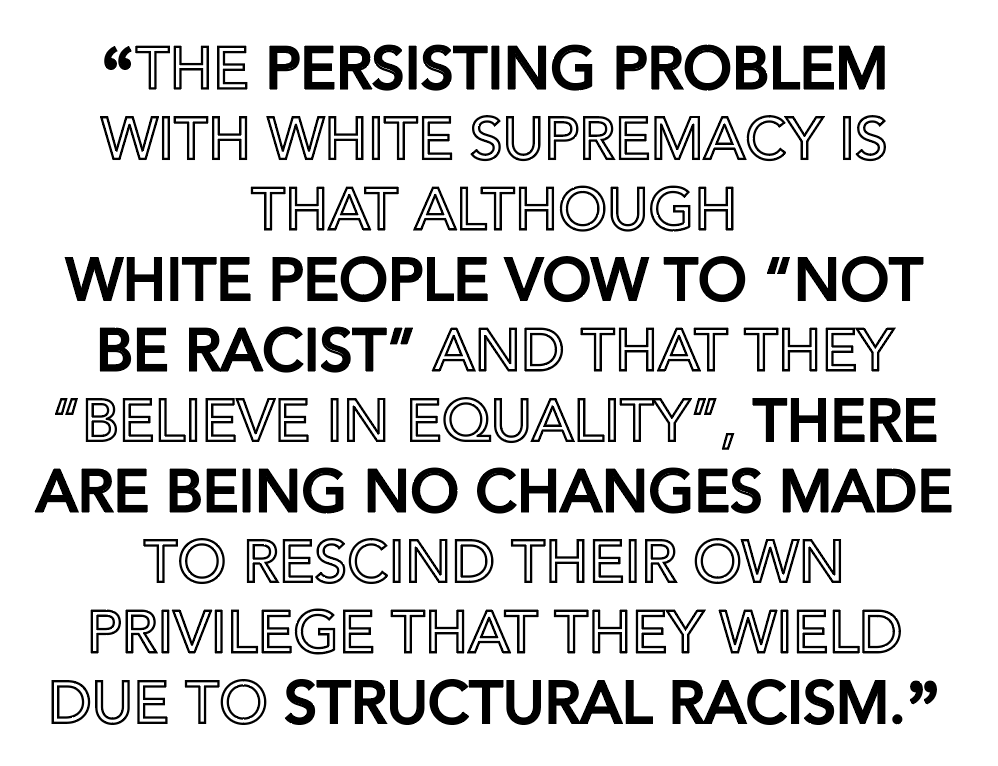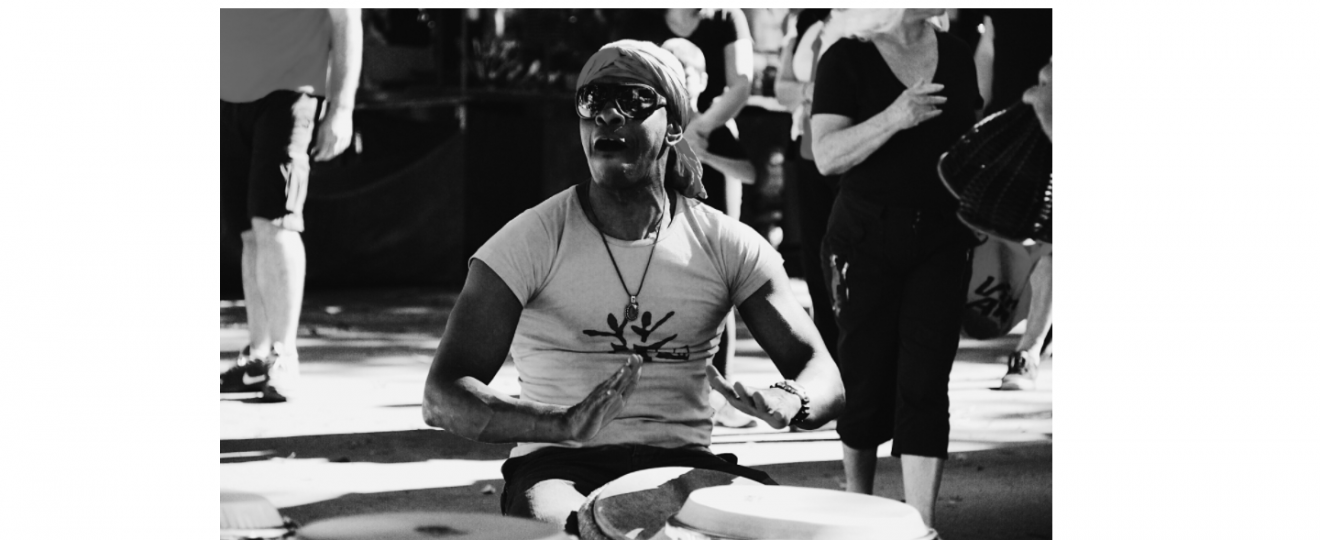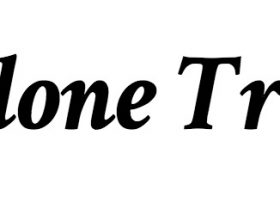As bell hooks puts it in The Will to Change, the political system in America is an “imperialist white-supremacist capitalist patriarchy”. This also applies to the UK. We live in an ugly world, and the root of that problem is people’s refusal to change. White people refuse to rescind their power. White people refuse to admit that they continue to benefit from a historically rooted system of white supremacy. White people refuse to admit their complicity. BIPOC worldwide continue to die at the hands of white supremacy.

White supremacy manifests in both overt and covert forms. The overt and covert forms work together to keep the structure intact; so, when you participate in one form, you are protecting the other. One of the most insidious and widely practiced forms of white supremacy is cultural appropriation. In her book So You Want to Talk About Race, Ijeoma Oluo defines cultural appropriation as “the adoption or exploitation of another culture by a more dominant culture”. We notoriously see the Kardashians and the Jenners practicing cultural appropriation in the form of aesthetic white washing – for example, Kim calling cornrows “Bo Derek” braids, and saying she was “like, really into it”. However, cultural appropriation goes beyond aesthetics. People can create a livelihood appropriating and profiting on another culture – which again, for the sake of ease, we can use the Kardashians & Jenners as an example, with many accusing Kylie’s cosmetic empire of being based in cultural appropriation. When discussing this issue on The View, Sunny Hostin summed it up pretty succinctly: Kylie made her fortune with the lip-fillers, and parlayed that into the lip-kits, because she had big lips. So, is it cultural appropriation? Is Kris Jenner this evil genius that understands that “being close to black culture can make you money, but being black cannot?”
The point being: a lot of white people create their livelihood by appropriating black culture. Many of these people have gone silent right now, in the wake of the murder of George Floyd. No signs of solidarity, no sharing information on ways to help, just silence. I understand that social media posts are not everything; you never know what someone is doing behind the screen to help. I completely believe that as a white person, merely expressing your sadness online does nothing; donating to bailout funds, your community, and black businesses (to name a few) is undeniably what you need to do. However, the influence of social media cannot be contested; if used correctly, it is an educational tool, a resource, a place where we can learn and converse, a place where we can show solidarity, alongside giving our money and resources to black communities.
As one of my favourite DJs Jyoty put it on her Instagram story a few days ago (on people who have remained silent in the current circumstances):
“People who play black music. People who create fashion that comes from black fashion. People who write about black culture. People who fetishise black people – which is actually a deeper-rooted issue that we can’t even get into right now. If you have your back blown out by black men all the time because you have a weird obsession with that and you’re silent right now then you’re fucked. You have been benefitting on and moving forward from that, whether that’s through a way of money, or your career, or emotional, psychological… The oppressor looks like you. […]
We spend all our time and all our days sitting in these meetings, DJ sets, and events, whatever… constantly seeing how an entire race is being used and abused, but when they’re actually being abused in a violent and physical manner… people have gone quiet. How could you? […] You’ve been in the passenger seat all this time. You’ve been in the driver seat this whole time, let’s be honest! And you’ve really and truly lead this car off the cliff.”
I was driven to write this article after personally engaging in my own anti-racist work (which white people all have the obligation to do). In the book Me and White Supremacy by Layla Saad, she asks: “How have you profited (socially or financially) from cultural appropriation?” (p. 120). Despite not having started a career yet, I have looked at the work that I currently create or participate in; as a writer, as an artist, and as an occasional student DJ.
I have written a number of articles about black experiences. I have written an article about the injustice of censoring drill music, about mental health in rap music, about the power of dancehall music, about the debt that British society musically owes to the Windrush generation. Although I think it is an inherently good thing to raise awareness of such issues and give the conversation a platform, I think issues lie within this. I am a white womxn, writing about black issues. When writing articles on black issues, although I did not benefit economically from writing them, I learned and researched using sources written by black people. To make my actions and work truly anti-racist in the future, I vow to share work by black artists or writers on these topics first, instead of writing about them myself. It is often not my story to tell, and many black writers are out there writing about these issues, and deserved to be listened to. If I choose to write about black culture in the future, I will provide a list of sources from black writers who have written/are continuously writing about the same topic. The persisting problem with white supremacy is that although white people vow to “not be racist” and that they “believe in equality”, there are being no changes made to rescind their own privilege that they wield due to structural racism.
To truly reach equality, if you are in a social group that wields power over another, then you need to change your actions, and share or give up your resources. You have to give up the space you occupy to make room for others, whilst continuing to do your thing in an inclusive and conscious manner. I am vowing to work harder, be better, educate myself consistently; to own up to my mistakes, and to encourage other white people to do the same. I will continue to love and support black culture like I have been doing for many years now, but I will give back to the communities that I am benefitting from. You can’t take from a culture that you give nothing back to. As many posts on Instagram have been reading in the past few days: love black people like you love black culture. I actually initially considered asking for my articles to be taken down. After speaking to my friend and fellow BRIZO writer Nadia, she encouraged me to write about my mistakes, rather than eradicating them. To which I completely agree with; what good does erasure do? The only way to truly be anti-racist is to hold yourself accountable. Call yourself, and those around you, out for the ways they can do better.

Again, I am a white womxn in a predominantly white town, playing black music. Every time I DJ, I profit socially from the work of black artists. On one occasion, I benefited economically from a DJ set; for one hour, I played only dancehall music. Something about this does not sit right – a white, middle-class British womxn benefiting economically from DJing Jamaican music. Since, I have donated the money I earned from that hour to the Rita Marley Foundation, which seeks to empower and expand education throughout the Jamaican diaspora. I want to emphasise that I am not saying if you are a DJ, and you play music that doesn’t directly come from your culture, then that the money earned from your labour is not yours. Of course it is. When I DJ in the future, I will continue to play and champion the music I love. I am however urging you to be conscious, and when you can, give back and support the communities that you profit on. Don’t be silent or hide when white supremacy is white supremacing across the globe. The current UK music club scene is centred and built on black music. So, white people, you need to check yourself and ask yourself the ways you have profited socially or economically from the work of BIPOC.
If you feel embarrassed or attacked by this article, then ask yourself why. If you think I am being radical, ask yourself why. Without radical honesty, there cannot be radical change. If I don’t owe up to my mistakes, and encourage others to do the same, how will we progress? If the death that white supremacy has historically caused and continues to cause (in astonishing amounts) won’t push you to change, then what will? As I said at the beginning of this article, white supremacy manifests in both overt and covert forms, which work together to keep the structure intact; so, when you participate in one form, you are protecting the other. If you don’t root out the ways you are covertly practicing white supremacy, then we can’t truly progress; even if you are acting with the best intentions. Intentions mean nothing without action.
A tweet from Ijeoma Oluo:
“The beaty of anti-racism is that you don’t have to pretend to be free of racism to be anti-racist. Anti-racism is the commitment to fight racism wherever you find it, including in yourself. And it’s the only way forward.”
Publications and podcasts written/hosted by BIPOC which have informed my articles on black music and social issues:
cover photograph by Isabella Baxter




